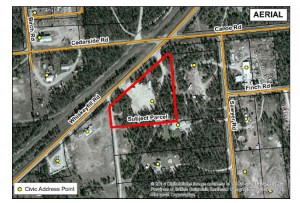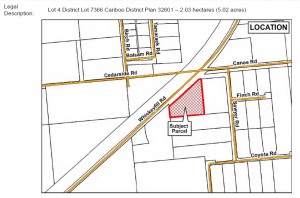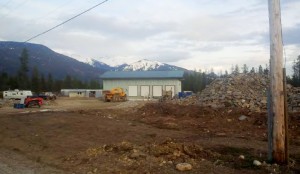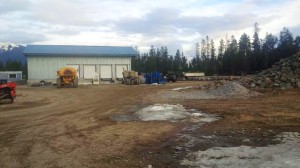By: Korie Marshall
The Regional District Board has issued a temporary use permit for one year to Valemount Stone Company. One resident says she feels betrayed by the decision.
The permit will allow rock washing, sorting and packaging on a property owned by Sherry Kapelari on Whiskey Fill Road, near Cedarside.
Valemount Stone had been allowed to store rock there under the current Industrial 2 (M2) zoning, but the zoning does not allow the processing of rock, such as washing and sorting. The official community plan for the area designates it and surrounding areas for future use as Heavy Industrial (H/IND), which would permit rock washing and sorting as well as other mining activities. However a number of new residential properties have been developed in the area, including a bed and breakfast since the OCP was last updated in 2006. The property is marked as an area of interest in the Robson Valley Industrial Lands Study done in 2012 by the Regional District.
The proponent applied for a three-year temporary use permit “as a result of a bylaw enforcement process” says a report to the Board. “The applicant would like to bring the operations on the subject parcel into compliance.”
A public meeting was held on March 5th at the Canoe Valley Recreation Centre, with a crowd of about 40 attending. Karren Coleman submitted one of the 14 letters read at the hearing, almost all strongly opposing the permit. She says the neighbourhood has been disrupted by the noise and her biggest concerns now that the permit has been approved are for the water table in the area and for resale value of the neighbouring properties. She is intending to sell her own propert, because she can no longer handle looking after her horses by herself in the winter. The applicant told the Regional District during the review process that the operation will use 500 gallons of water per day. The source is an existing well that supplies the building, and the water will drain into the ground and be used as dust control.
Coleman says she is not mad at the business owner and knows it is a good business, providing income and jobs, but says it should not be near an existing bed and breakfast and other residences. She feels the owners should have done their research to know that the property was not zoned for their intended use.
And she says there was so much opposition to the permit she doesn’t see why it should have been approved.
“We’ve been betrayed,” she says, speaking of the Regional District’s process to review the temporary use permit. “They listened – or did they?”
Coleman thinks the board’s decision on the permit must have been already made before the public hearing. She says the business didn’t stop working when they got the order from the Regional District to stop in the fall, but the Regional District didn’t do anything about it.
“If you go hunting or fishing without a license, it doesn’t matter if you don’t know the law, you get a fine,” says Coleman.
She says the Regional District has promised her they are looking for another spot for the rock washing business – but a verbal promise means nothing to her.
A number of residents also spoke against the permit at the hearing, while some said the business did not disturb them, and they’ve made compromises to have less impact on the neighbourhood.
“Everybody is entitled to their opinion, but there is lots of stuff that is just kind of nonsense,” said Jim Wanchulak, owner of Valemount Stone, about the many negative letters. “We have a train going by 24 times a day, and it is a crossing, so the whistle goes. If that doesn’t wake you up, I don’t know what does.” He said one type of equipment he had been using, referred to as a skeleton bucket, was very noisy, but that the company has stopped using it.
Terry McEachen, general manager of development services for the district, said the permit was approved with several changes from the original draft, including shifting the hours of operation an hour later to 8am – 4pm; the days of operation will be Monday to Friday excluding statutory holidays and only maintenance and mechanical repair will be allowed on the site on the weekends; mechanical breaking of rock and the use of a skeleton bucket will be specifically prohibited; the term of the permit was reduced from three years to one; and a condition was added limiting the number of loads of rock delivered to the site to 15 per week.







